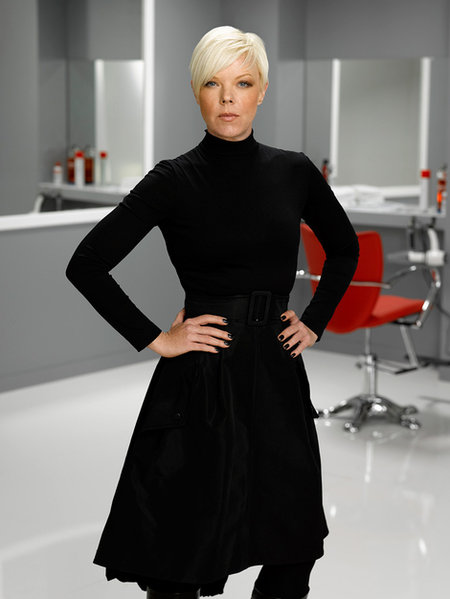One of the downsides to eliminating cable TV in my house is that I don’t catch any new shows. On my recent flight to Miami I caught the Bravo show Salon Takeover and immediately was hooked by the unique approach of the show. Finding it on Amazon streaming video when I returned home meant I could catch up on three seasons worth of shows in the past few weeks.
While many people focus on the attitude of the show’s expert, Tabatha Coffey, I loved watching her tear down and recreate systems and address problems in each business. I came away with a slew of lessons and I would love to share some of them with you because even if you don’t have a professional hair salon, your business (and mine) can learn from Tabatha’s insights.
It’s very tempting to dissect and entire episode but honestly, there are just too many great lessons in each 40 minute show! Instead I’ll take just one lesson and show you how to use Tabatha’s rules in your own business.
In the inaugural episode I was intrigued by the management problems that Ten Salon in Long Beach faced. Unlike many of the following episodes with no rules or directions, this salon had too many rules.
Everyone except the owners seemed to see the problem with one stylist noting “they think their systems are black and white but with so many systems it becomes gray.” Instead of creating clear expectations, the rules manuals included too many scripts, rules and write ups to be effective.
Tabatha noted, “with so many procedures it’s like being in kindergarten” and as a result 80 employees had left or been fired in a two year period. Instead of creating stability and consistency in the business, the rules manuals were hurting the business and costing the owners money.
The problem is not the owners who desired to create effective systems and document what works.
The real issue was the owner’s personal belief that she had to be an expert in everything.
Interviews with the salon owner were incredibly insightful to how she viewed the manuals and her role in the business. In defending the manuals she said, “we try to write a procedure for everything that happens or could happen.”
It’s obvious to me but should be noted that if you spend all of your time writing down all the things that could happen then you’re going to stifle and strangle your team.
In the salon there were scripts for every customer interaction which often left the employees flipping through the book to read the right script instead of talking to the client. A simpler, more effective system would lay out guidelines and create the right atmosphere.
The front desk phone systems could include guidelines such as:
identify the salon by name
introduce yourself
listen carefully to the caller and answers without rambling
if you don’t know an answer here’s who you should ask…
be enthusiastic, helpful and warm! we want our clients to enjoy coming in and that starts with your interaction on the phone
See how those simple guidelines can replace pages and pages of scripts?
As Tabatha made changes to the salon, including a beautiful new design, stylish reception area and suggestions to the staff it was clear that the owner was ill prepared for change.
After one breakdown of tears and hyperventilating, the owner confessed, “Seeing all the changes made me feel like a failure. I am someone whose supposed to have the answers for everything because it’s my business, right?”
This attitude is incredibly detrimental to an entrepreneur for a few reasons. First, you’ll end up investing a lot more time, money and energy in figuring out how to do everything yourself rather than humbly ask for help and while you may find the right solution eventually it will cost you more grief than necessary.
Second, the owner who tries to be the expert in ‘everything’ closes herself off to the wealth of knowledge and opportunity around her business. Team members, colleagues, courses, feedback – these are all opportunities to learn and grow. Closing yourself off because “it’s my business” will limit your growth potential.
Third, you cannot manage the vision of your business, the marketing and growth so you can serve more people if you’re constantly nitpicking. This was something Tabatha picked up on right away when she asked:
“There’s a big difference between managing something and micromanaging. Do you do that?”
Consider your interactions with your team – do you always find something they can do better? Do you feel that they will never be good enough?
It’s very demoralizing to hear constant criticism and expectations of perfection.
This is not to say that you should be ‘rah rah everything is fine’ ignorant but there has to be balance. Give a compliment to your team without adding “but next time…” at the end. Consider how far someone in your training has come and be honest about their growth.
If a team member is truly ignoring your process, unwilling to grow and refuses to follow direction then something must be done. But don’t treat your employees as if they are children who need to be guided every minute of the day when they’ve proven themselves capable and earned your trust.
The fourth way this attitude of “I can do it myself!” is detrimental is probably the most important. Tabatha said it best:
“Your team is hungry. Hungry for someone to lead them, not preach at them! Give them motivation, let them see your passion, lead by example!”
Enabling the team to see your vision and passion for the work is critical. And when you have the right team who understand your reason for being in business and they see that you’re open and receptive to learning you may be surprised.
In the episode, Tabatha was astonished to see the front desk coordinator out marketing the salon, greeting new clients and acting drastically different than the rude, robotic person she’d observed on day 1. With the stifling rules gone, the coordinator stepped up and took a leadership role, helping to grow the business in the following months.
It’s interesting to me that even the style of the show itself has changed and shifted since the first episode. Having a system and making improvements is healthy for a business and can help you reach your goals. In doing so, enable and empower a team to support your goals and bring their expertise.
photo source, Episode 1.1 Ten Salon

 Systems are the Answer to your Struggles
Systems are the Answer to your Struggles Never Train Your Employees Again
Never Train Your Employees Again Do you like money?
Do you like money?